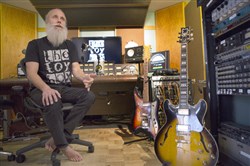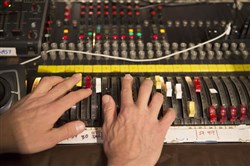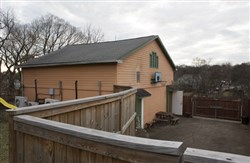VOL. 42 | NO. 10 | Friday, March 9, 2018
Work at home? Yes. Customers? No.
By Jeannie Naujeck
“Chet Atkins’ Workshop’’ was the best-selling album of the guitarist’s career, earning Atkins a gold record in the 60s.
Today, it would probably get him a Metro Codes violation.
Home studios like the one where Atkins recorded his 1960 masterpiece and other home-based businesses that serve customers are against the law in Music City, but two Nashville residents are suing to change that.
Lij Shaw, who wants to run a recording studio out of his home, and Pat Raynor, who wants to style hair in her garage, filed a lawsuit against Metro stating the local zoning ordinance that restricts them from operating their businesses is “arbitrary” and “unreasonable.”
The plaintiffs, backed by two libertarian legal organizations, want a court order to stop Metro from enforcing a zoning ordinance that prohibits home-based business owners from serving clients or patrons on their property.
That includes music teachers, school tutors, makeup artists or anyone else who provides a personal “retail” service out of their home.
“Anyone who’s taken a piano lesson from a neighbor or family friend has gone to a home business that violates this law, if it’s within Nashville’s jurisdiction,” says Keith Diggs, an attorney with the Institute for Justice who is representing Shaw and Raynor.
“Lij can have a 12-person band over to spend the night at his house as an owner-occupied short-term rental, but he can’t bring them over for an hour to record a song. It’s bizarre.”
Diggs adds he knows of no other city in Tennessee that has a similar blanket ban on customers. But he says he believes there are hundreds of similar home businesses operating illegally in Nashville.
And the only way Metro enforces the ban is through a web form with which people can tattle on each other – without having to sign their name or prove a legitimate complaint.
Neither Shaw nor Raynor know who reported them – or why. But Raynor adds she believes she was turned in by a competitor doing the same thing nearby.
“Anybody can call in anybody,” she points out.
“Somebody complains, and they close you down. Metro Council doesn’t have to do anything, and they like it that way. They allow adults to bully other adults by allowing the public to do the work for them instead of sitting down and setting criteria for exactly what kind of business you can and can’t have in your home.”
What Raynor wants, she says, is for Metro to make an exception to the customer ban for certain businesses such as hers. Shaw adds that he believes the prohibition on client visits violates rights given by the Tennessee Constitution.
But Metro has filed a motion to dismiss the case, arguing that no such constitutional rights exist, and that the client prohibition in Metro’s Code has a legitimate governmental purpose in keeping commercial activity out of residential districts.
Lawsuit is ‘only way’
Many people work from home – and the code even allows for one employee – but those who provide professional services such as freelance writing, graphic design, architecture services, business advising and the like aren’t affected by the customer ban because they generally don’t meet with clients in their homes.
Artisans who sell handmade goods on Etsy or “pickers” who resell vintage clothes through eBay aren’t affected, either.
Nashville attorney Jean Dyer Harrison isn’t optimistic that Shaw and Raynor can get the customer ban changed.
“I do not think they will get anywhere with that case because it’s been argued before,” she explains.
“You can get a home occupation permit to have you and one employee for specific kinds of businesses, but you cannot open a retail establishment in a home and both those professions fall in that category.
“It’s tough to police, of course, but it isn’t legal, hasn’t been and won’t be. That’s just not a battle you can win.”

Lij Shaw, owner of The Toy Box Studio, is one of two business owners who have filed suit against Metro challenging a ban on serving customers in home businesses.
-- Michelle Morrow | The LedgerBut on March 16, attorneys from the Institute for Justice, a libertarian-leaning civil rights law firm that fights government regulation around the country, will counter Metro’s motion for dismissal. They claim that there is case precedent in the state that provides a basis for the lawsuit.
And while Raynor never wanted to take her battle to court, she’s grateful for their support.
“I’ve done everything I can possibly do. Nobody wants to listen and nobody wants to do anything about it,” Raynor says.
“The lawsuit is the only way to get anyone’s attention.”
Toy story
Shaw opened his Toy Box recording studio in 2007 in a detached building behind his house in East Nashville. The neighborhood includes the auto diesel college, numerous rental properties and train tracks that run one block away from Shaw’s house.
Shaw invested a significant amount of money in instruments and recording gear, including a vintage console on which classic albums including Eagles’ “Hotel California,’’ Eric Clapton’s “461 Ocean Boulevard,’’ Crosby, Stills & Nash’s “CSN,’’ and the soundtracks to “Saturday Night Fever’’ and “Grease’’ were recorded.
He professionally soundproofed the 750-square-foot studio – partly to protect the neighbors from noise but also to prevent the sounds of the trains from making it onto recordings. The long driveway running through the property has enough off-street parking for about half a dozen cars.
For eight years, he made the studio a success, mixing a Grammy-winning album and recording both big name and beginning artists alike. He was able to support his daughter, Sarayah, without leaving home. And he had good relationships with his neighbors.

Lij Shaw on his sound board, which was used to make some of the music industry’s most memorable albums.
-- Michelle Morrow | The LedgerBut in August 2015, he received a cease and desist letter from Metro, followed by phone calls from a Metro Codes inspector. Someone had complained anonymously. He was ordered to remove his equipment, as well as any form of advertising.
Last February, Shaw asked the Planning Commission to grant him an SP (specific plan) rezoning that would allow him to operate the studio commercially. His councilman, Scott Davis, spoke on his behalf.
Shaw submitted a petition with 40 neighbors’ signatures, plus six handwritten letters. Fifteen people accompanied him. But he was turned down.
Shaw says Metro’s shut-down has been “totally devastating” to his business.
“All the growth and momentum I had created was killed,” he says. “Nashville is one of the few places left in the world where the greatest musicians in the world can still get together and make music face to face in front of microphones.
“I just believe that I have a right to be able to do that in my home studio so I’m fighting for my right to record because everybody else knows that home studios work in Music City.”
A long history
Home recording studios do have a long history in Tennessee.
On “Chet Atkins’ Workshop’’ album cover, the famous fingerpicker is pictured in his home studio, where he often preferred to sequester himself to work out tunes, according to the liner notes by then-Tennessean writer David Halberstam.
“And he had full access to RCA studios A and B the whole time,” musician and music historian Pete Finney notes.
Owen Bradley’s Bradley’s Barn in Mt. Juliet was converted into a studio in 1965 and recorded dozens of country and pop acts. Buzz Cason, who wrote the classic song, “Everlasting Love,’’ had a home studio on Ardee Avenue in Inglewood.

The Toy Box Studio is a stand-alone building in back of Lij Shaw’s East Nashville home. He says he has ample parking to keep clients from taking up street spaces.
-- Michelle Morrow | The LedgerGuitarist Wayne Moss has run Cinderella Studios out of his Madison home for more than 50 years and recorded artists including Bob Dylan, Linda Ronstadt and Steve Miller. Miller even credited Cinderella as the inspiration for his own home studio in San Francisco, where he recorded many of his hits.
“There are tons of people here who have studios,” musician Bill Lloyd says.
“But you have to fly under the radar if you can.”
Shaw, now 50, was not willing to do that. A tech enthusiast and early adopter, he hosted a podcast about cryptocurrencies such as Bitcoin years before it hit the mainstream. When he launched Toy Box, he wanted to harness the internet to draw clients from all over the world.
So, unlike other studio owners, he built a website, added free content, webcast live studio sessions, and bought Google ads.
“Others operate apologetically, on the down low. They don’t advertise or have a web site; it’s just word of mouth,” Shaw acknowledges.
“I stuck my neck out because I think I have a right to make an honest living in my own home. I’ve got to feed my daughter and keep a roof over my head.”
Shaw’s current studio intern, Allan Boudreau-Fine, a senior at Vanderbilt University, says he hopes to stay in Nashville after he graduates to pursue a music career.
But he adds Nashville’s prohibition on home studios is outmoded and stifles young producers already facing strong headwinds in the music business.
“Artistically, it’s just a huge damper on a city that is literally called Music City,” he says.
“I would like to stay here and make music but it’s hard to get your foot in the door at a commercial place and the number of positions that are available is just so small.”
Boudreau-Fine says new technology allows almost anyone to make a recording of good quality without investing a lot of money.
“Everyone records in their dorm room,” he points out.
“My friend who graduated last year has a setup in his house. If you have your own setup as an engineer and music producer you can work with artists you want to work with. Owning your own place is a cool opportunity that should be provided to those who invest the money to do so.”
Pat’s story
Pat Raynor is in a slightly different position. Now 67, she has spent her career as a hair stylist and has a roster of longtime clients.
After her husband’s death, Raynor decided to secure her retirement by converting her small garage into a one-chair salon with the idea of seeing about six clients a day, one at a time, for three or four days a week. While her house fronts a busy street in Donelson, her driveway and garage are private, at the end of a cul de sac and a good distance away from neighbors.
Raynor paid a $100 fee, installed her equipment, was inspected by the state and got the necessary permit for a home salon. But she, too, received a cease and desist letter from Codes after being reported by an unnamed person. Last year her SP rezoning request was also denied. Her councilman did not support her.
Raynor understands the “slippery slope” argument of residential zoning restrictions. She’s asking Metro to differentiate a business like hers, which would quietly and almost invisibly serve one visitor at a time, from a high-volume business such as a storefront.
Raynor says the prohibition on having her customers come to her house is especially galling because hairstylists and barbers are now allowed to make “house calls,” thanks to a new state law that took effect Jan. 1.
“I can go to someone’s house, park in their driveway or on the street and do their hair – and their house is not inspected,” she explains. “But they can’t come to my house, which has been inspected. How silly is that?”
She also finds it ironic that, under current policy, she could rent out her house to Airbnb guests without any problem from the city.
“Cottage businesses like mine don’t have loads of people coming at once,” she adds. “Mine don’t spend the night like Airbnb. Mine don’t run in everybody’s yard and throw bottles like Airbnb. It’s not invasive.”
Lawsuit a last resort
The two law firms that are representing Shaw and Raynor – the D.C.-based Institute for Justice and Nashville’s Beacon Center – aim to enhance the rights of the individual through the cases they take on.
The Beacon Center has represented Nashville property owners fighting restrictions on Airbnb hosting. Recently, it took up a case that will challenge a state licensing requirement for barbers to have a high school diploma. Last year, the Beacon Center successfully challenged the state’s requirement that shampooers be licensed. (Yes, shampooers.)
Raynor points out she is fighting for two groups of people: those like her who are near retirement age and still want or need to work, and younger women who want to stay home with their children but still have an income.
“I’m very passionate about it,” she says. “As I get older, I will not be able to continue to work the way I do now. Here, I don’t have as much overhead. I wouldn’t have to work the long hours and days to take some money home. I think there are a lot of people out there like me who can’t quite retire, or don’t want to.”
Shaw says he gets a lot of support from people like him also – fellow studio owners who don’t want to make their names public but are rooting for him to win on their behalf.
“Everybody’s in the same boat as me, but I’m in a unique position because my neck’s already out there and I have this incredible legal team where I may be able to make a change for everybody,” he says.
“My goal is to go through this so that Nashville finally solves this and we are able to make music in Music City, proudly and unapologetically.”